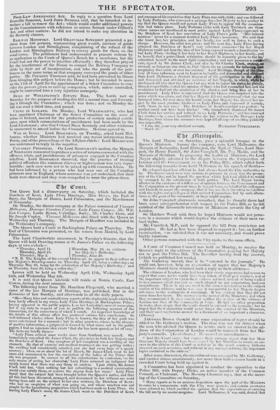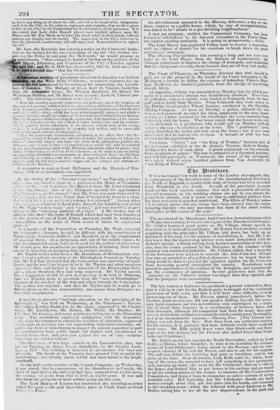A Court of Common Council was held on Monday, to
receive the Queen's reply to the address of the Corporation praying her Majesty not to pass the Police Bill. The Recorder having read the answer, (which we published last week,) Mr. Galloway moved, that it be " entered in the journals." He could not, however, help an eepression of regret that her Majesty's Ministers should have returned such a reply to their address— The chisel's of London, who 11:1,1 been their steady supporters, had reason to expect that soine notice %vould have liven taken of their past conduet, and of the important subject to which thrir nthlress ref'crred, instead of being- replied to in a manner which was just as lunch adapted to any corporation, however insignificant. There is not one word in the answer in reference to the suliject matter address; and he was sure it was painfitl to her Mujesty to give utterance to the sentiments it contained. It wet: evident that they did not come front her hurt. The answer was the answer of the 3Iinist Inc ; and when they recommend,s11 it, they consithred neither the mm.si■lisise of the citizens of London nor thin of the community at Isrge. Ile Int I no other proposition to make, tban simply thst the words should be entered id the journals : but he hoped that the Corpinsation woulil never tiwget the conduct of the Ministers, and thVir MOSt tiOgradOlIS allSWer to a dOCOIllinit a So important a character.
(Cheers.)
Aldernum- Brown thonglit that some expression of' regret should be added to Mr. Gallowny's motifm. The time was not for distaet when the men who advised the Queen to return such an answer to the ad- dress of the Corporation of London would be removed from her Ma- jesty's councils. (Lhod cheers.) .1112 111.0Vel :111 amendment- " And this Court cam; but express their eNtPCIIIC YegiTt that her Most G melons 3Iajesty should have been advised iuv her Ministers to return an an- swer to the adlteSS of this Court :so deficient in tin: usual courtesy hitherto observed on such occasion,, and without in avy manner noticing the important topics contained in the address."
After some discussion, the amendment was accepted by Mr. Galloway, and carried almost unanimously, not more than I ta lf-a - dozen hands in a crowded Court being held up against it.
A Committee has been appointed to conduct the opposition to the Police Bill, with Deputy Hicks, an active member of the Common Council, as Chairman. The Morning Chronicle says, that at the meet- ing of the Committee on Saturday, " Many reports as to an anxious disposition upon the pert of the Ministers to come to it compromise with the City were quoted ; mid certain overtures were referred to, which justified the opinion that the expectations of carrying the bill are by no means sauguine. Lord Melbourne, it was said, denied that
he knew any thing at all about the bill; nna wleet be heara of the indiration excited in the City on the subject, expressed such surprise, that credit is given to hint in the City by the Corporation for the declaration of Isis ignorance. It is also stated that Lord John Russell placed such implicit reliance upon Mr. Hawes and Mr. Fox Mettle as to leave the whole affair in their hands, without makities any inquiry iuto its merits. The impression in the City, however, is, that the Lambeth constituency will call upon their Representatives to oppose the bill."
Mr. Law, the Recorder, has entered a notice on the Commons' books, that on the motion for the sue:el reading (4' the bill "for further Im- proving the Police in and near the Metropolis," he would propose as aaraAn amendment, "that counsel be heard at the bar on the petition of the 'aMont Mayor, Aldermen, and Commons of the City af London, against ''tille,said bill ; and Sir B. Hall Juts given notice that he shall move that it begead.a second time "that day six months."



























 Previous page
Previous page